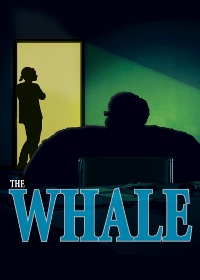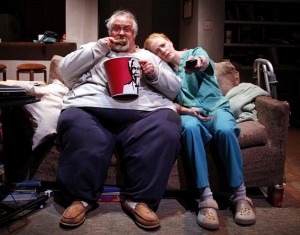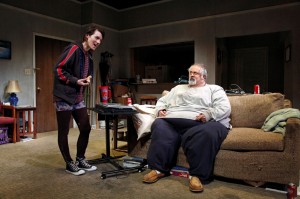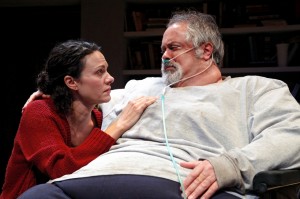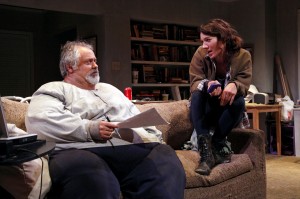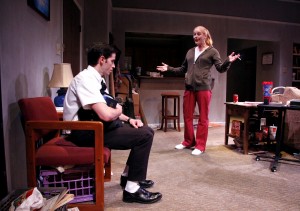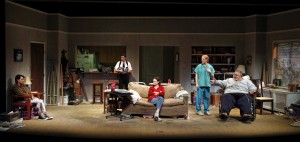NOT WORTH THE WEIGHT
The title of Samuel D. Hunter’s The Whale refers to three things. The first is Charlie, a homebound, 600-pound tutor who instructs online classes in expository writing. Second is a student essay on Moby-Dick. The third is the biblical story of Jonah.
At the top of South Coast Rep’s production, Charlie, who refuses medical treatment even as he suffers from congestive heart failure, has a particularly acute attack after masturbating to gay porn. A young Mormon missionary — who happens upon Charlie’s foul-smelling apartment just in time to witness the event — is forced by Charlie to read the Moby-Dick essay aloud. This brings medicinal solace to the obese man, who has been eating himself to death since the passing of his lover 15 years earlier. Missionary Elder Thomas, who will later reference Jonah, remains while Charlie’s longtime friend and caregiver, Liz, arrives and informs Charlie that he will no doubt die by the weekend if he doesn’t go to the hospital.
Charlie leaves for the bathroom. Watching actor Matthew Arkin waddle slowly and painfully offstage is one of the most exquisitely discomfiting moments you will see in the theater (the amazing face prosthetics and fat suit are designed and supervised by Kevin Haney). His physicality is so palpably real and the situation thus far so startlingly uncomfortable that it feels like an invasion of privacy.
But ten minutes into the play — just when Liz rants at Elder Thomas about how she “fucking hates Mormonism” — the kitchen sink realism goes south. There is a sense that the script, however intriguing, is underdeveloped. The thrust of the play will ultimately be about Charlie and his desire to connect with his rebelliously venomous 17-year-old daughter, Ellie (whom he hasn’t seen in fifteen years). But once the foul-mouthed, funny, social misfit Ellie arrives at Charlie’s, one of two things will happen: Either you will be sympathetic to a very well-intentioned evening or you will be put-off by the script’s soapy obviousness and director Martin Benson’s heavy-handed approach to the material.
Both script and direction issues are personified by Ellie. Hunter adroitly captures Ellie’s combination Goth/Valley Girl patois, but she has been written as a blatant caricature of a distressed teenager. This is disagreeable enough, but Benson (also SCR’s Founding Artistic Director) allows Helen Sadler to inhabit a tough-guy exterior as Ellie, coming off more like one of the Lost Boys or a bully from The Little Rascals than a troubled adolescent. This is exactly the type of exaggerated performance expected from Saturday Night Live, not from a prestigious regional theater.
There is also gallows humor in the script, but while it may be grimly amusing to have Liz the nurse smoking in the tiny apartment of her best friend who is dying of heart disease, that act — along with her presentation to Charlie of a bucket of fried chicken — simply does not ring true. Later, Charlie’s ex-wife Mary (Jennifer Christopher) arrives and, in a turn of insupportable irony, Liz (a humorless and bitchy Blake Lindsley) will tell her that “second-hand smoke isn’t really a good idea” (we never will discover Liz’s true motivations for simultaneously fighting for and against Charlie’s health).
Moreover, instead of being a multi-layered character, Liz becomes a vehicle for a litany of exposition, especially when describing her family background with the Mormon Church to Elder Thomas. As Liz, Lindsley delivers her lines so pointedly and forcefully (as do the other actresses), that her heightened sense of drama reads more false than theatrical. Jennifer Christopher offers the most convincing female acting in the worst-written, one-note role of Charlie’s ex, Mary.
The very agile and compassionate Charlie is consistently apologetic to other characters, and that is exactly how Arkin plays the corpulent instructor. With each “I’m sorry,” Arkin is consistently and genuinely contrite, but the more interesting choice would be to have Charlie played against type. Arkin, for all of his sincerity, leans towards the unemotional and a sort of blasé humanity, almost as if he is addressing Muppets on Sesame Street. Interestingly, he is more pointed and urgent when addressing his students via computer, but this makes Charlie’s empathetic interaction with family, however accurate, all the more uncompelling. And for no reason other than instinct, I never bought that Charlie is gay. However, while his choices seem opaque, Arkin’s physical interpretation of the doomed leviathan is a triumph.
Wyatt Fenner as Elder Thomas makes the strongest impression; his combination of goofy, scared and desperate makes him truly endearing and watchable; even with many an opportunity to do so, he never plays his character as heavily as those around him. Even forgiving the trespasses of the script – which isn’t horrible, just bloated with dramaturgical shortcuts – director Benson could have made his other actors believable and exciting. Under his watch, the mostly obvious acting, the Law and Order-type music (Michael Roth) and the spotlighting (Donna & Tom Ruzika) all indicate, rather than reinforce, the script’s possibilities. The normally exciting Thomas Buderwitz created a workaday, unimpressive one-room set, although there were clever touches, such as books propping up a sofa damaged by the weight of our protagonist.
Mr. Hunter has a knack for playwriting that is still in the “promising” stage, but his potential is much more realized in the Obie-winning A Bright New Boise, in which a man tries to reconnect with his son, than in Whale, which contains the earmarks of a nascent playwright still looking for his voice. Hunter’s script is also pocked with palatable truisms about connection, vulnerability and hopefulness. As a result, some audience members will either not notice or not care about the inherent obviousness and be responsive towards the one-dimensional characters. To them, this play will be most affecting. Indeed, on the night I attended, some patrons were incredibly moved and weeping at play’s end. (I only wish that I, like them and the main character, could swallow anything.)
Discerning viewers, however, will notice the questionable happenstances and simplistic use of symbols and metaphors running rampant on stage. One symbol, the essay which becomes a tool for more twists of fate, did not have to be about something as conspicuous as Moby Dick – it could have been about any disenfranchised character in literature. One of the head-scratching coincidences involved Alan, Charlie’s dead lover; he starved himself to death and was a Mormon, one who died under mysterious circumstances involving the Mormon church – but then a Mormon missionary just happens to arrive during Charlie’s death throes to resolve the mystery just before his inevitable demise.
It is telling that SCR’s resident dramaturg Kelly L. Miller calls this play “fiercely funny” and “heartbreaking.” No one will deny that the subject matter is touching and some of the script’s humor did eke through on stage, but it was never fiercely funny. And that’s because it lacked believability. It would have been interesting to see the results if Benson played up the humor instead of the pathos. Had this play been written as is in the 70s, it would not have been a stretch to cast James Coco as Charlie, Goldie Hawn as Liz and Mackenzie Phillips as Ellie. Yes, the script lacks maturity, but I wonder if the weighed-down production would have resonated for me had it not been stuffed with self-importance.
photos by Scott Brinegar/SCR
The Whale
South Coast Repertory in Coast Mesa
ends on March 31, 2013
for tickets, call visit SCR
